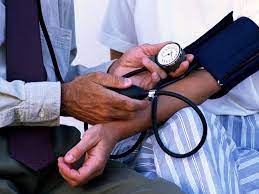3 Inevitable Symptoms Of Morning High Blood Pressure | Learn From An Expert
Millions of individuals worldwide suffer from one of the most prevalent illnesses: high blood pressure. In essence, blood pressure is the force or capacity exerted by blood on the arterial walls. Throughout the day, our blood pressure generally increases and falls. Less than 120/80 mmHg is considered normal blood pressure, according to the CDC. Your chance of developing additional health issues, such as heart disease, a heart attack, or a stroke, increases with your blood pressure.
Dr. V. Rajasekhar, a Senior Consultant Interventional Cardiologist and Electrophysiologist at Yashoda Hospitals in Hyderabad and a Certified Specialist for TAVR (Percutaneous Trans Aortic Valve Replacement), discussed some common morning signs of high blood pressure that one should not ignore in an interview with Jagran English.
Rajasekhar claims that hypertension is a prevalent medical condition that, if ignored, may have serious consequences. Elevated blood pressure in the early hours of the day, or morning hypertension, may be a significant marker of cardiovascular health. It’s critical to recognize the early warning symptoms of high blood pressure in order to intervene promptly and provide treatment.
Early Warning Signs of High Blood Pressure
1. Frequent headaches
Headaches that come on often are one prominent symptom of morning hypertension. People who have high blood pressure could wake up with a pounding headache because their blood vessels are under more strain. This symptom indicates the need for routine blood pressure monitoring and acts as an early warning indicator.
2. Lightheadedness
Another sign of elevated blood pressure in the morning might be dizziness. Increased blood pressure may cause the circulatory system’s equilibrium to be upset, which can cause dizziness or unsteadiness. If these symptoms continue, people should get help right away from a doctor.
3. Hazy Vision
Morning hypertension has also been linked to blurred vision. Visual abnormalities might result from the blood vessels’ increased pressure, which could impact the eyes’ fragile blood vessels. Any abrupt changes in vision should be carefully assessed by a medical practitioner to rule out any possible consequences from hypertension.
How to Control Elevations of Blood Pressure
People must actively check their blood pressure, according to Dr. Rajasekhar, particularly in the morning when variations may be more noticeable. Frequent home blood pressure monitoring may help identify any anomalies early and provide insightful information about one’s cardiovascular health.
He says that changing one’s lifestyle is essential to treating morning hypertension. A thorough strategy for controlling blood pressure must include eating a heart-healthy diet, exercising often, and practicing stress management. Furthermore, in some instances, prescription drugs from medical specialists could be required to successfully regulate blood pressure levels.
In summary, it is critical to identify morning hypertension symptoms in order to preserve cardiovascular health. These symptoms, which include headaches, lightheadedness, and blurred vision, are warning signs that shouldn’t be disregarded. Prompt action, in conjunction with dietary adjustments and medical advice, may help control blood pressure effectively and lower the risk of related problems. Attaining and maintaining ideal cardiovascular health requires regular contact with medical specialists and following recommended treatment plans.







